Maybe One Day People Will Understand We Do Not Want to Die
SONIAKH is starting the current programme with a new format of conversation that will highlight our current focus: introducing an international audience to the people who fought and defended, volunteered, survived the occupation and strikes or just continued to live despite these 10 years of Russia’s war against Ukraine. We treat personal stories, reflections, and recollections as analytical evidence and manual tools to undermine the apparatus of oppression, in which the mechanisms of its destruction are structurally embedded by default. Through tending to these memories, both recollected and forgotten, we can recover the collective vigour and means of resistance.
In this framework, SONIAKH’s curator Milena Khomchenko had a conversation with Timur Dzhafarov, a soldier of the Armed Forces of Ukraine and an electronic musician who performs under the name John Object. The conversation would delve into remembering the pre-war past, military service during the full-scale war, paradoxes of the international discussions and the decolonial future.
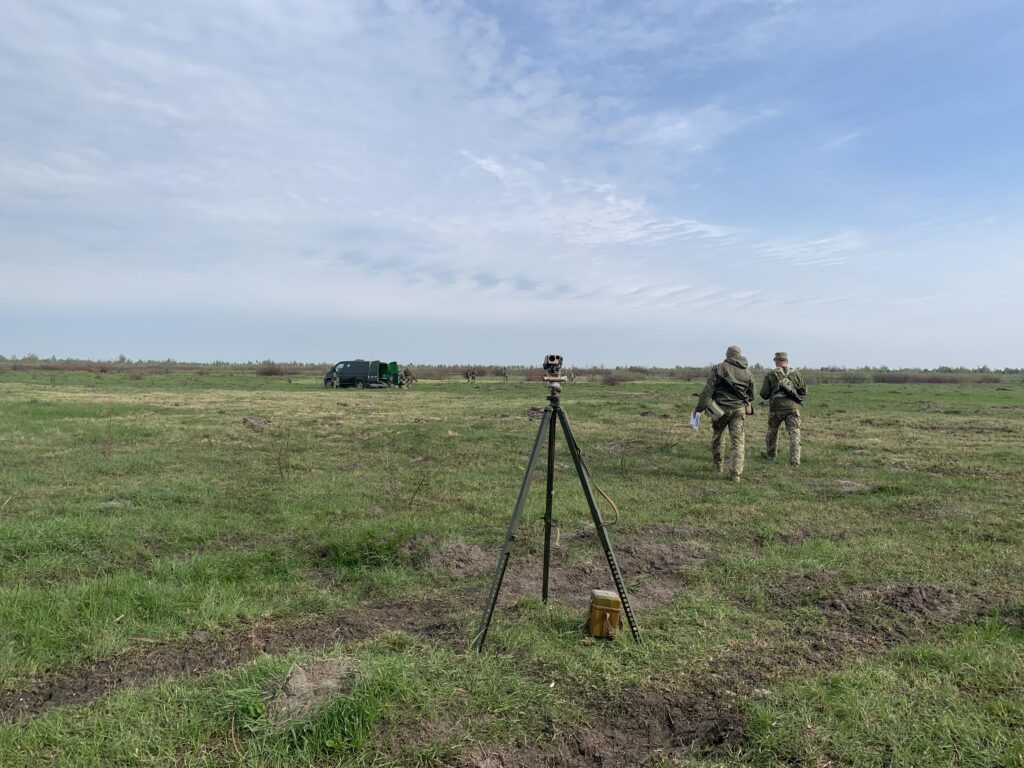
ERASING & RECALLING
Milena Khomchenko: Let’s start by recalling the past. What was the environment in which you grew up? Was there a presence of Russian influences in it?
Timur Dzhafarov: My father was born in Novosibirsk in a Tabasaran1 family from a village near Makhachkala. They moved to Novosibirsk in search of work or because of a job offer. Shortly after completing his military service,2 if I am not mistaken, my father moved to Kyiv and enrolled in a university. He was studying already in Kyiv—this move did not feel like a serious change of environment at the time, because Kyiv was almost as foreign to his Tabasaran family as Novosibirsk or Dnipropetrovsk,3 where they had also lived. The influence of Russia was rather manifested in the fact that Russians colonised several different ethnicities which made up my family—in this case Ukrainians and Tabasarans. No one in my family considered themselves Russian, no one actually was Russian, but due to the fact that all the countries were ʼunited’ as republics of the Soviet Union and it was impossible to go abroad, but possible to move within the USSR, these two cultures collided.
I remember how my grandfather watched Putin’s New Year’s address in the 2000s. He used to say: ‘Here, this is a man!’ but these exclamations, in my opinion, were more of an ignorant reaction to charisma, because I do not remember my grandfather being a politically active person. He just liked it when someone spoke sophisticatedly and pretended to know something. Nevertheless, my grandparents always considered themselves Tabasaran; they spoke a lot of Tabasaran at home and they only cooked dishes from their homeland. They continued to maintain ties with old friends whom they also invited to Kyiv. I think that it was easier for them to live in Ukraine than in some city in Russia, because they felt an unconscious desire for decolonisation here. Of course, they would have not called it that, but nonetheless a feeling that we were trying to be independent beyond the yoke of Moscow was present, just like for people in Dagestan.
So, I do not remember the Russian presence in my childhood, but it was an invisible axis around which many things revolved.
MK: You were born and lived all your life in Kyiv, right?
TD: Yes, I was born in Kyiv and lived here all my life. My father met my mother in Kyiv during his studies at the institute. My grandparents moved here later when I was nearly five years old; they lived in Dnipropetrovsk for some time before. It would be financially impossible for my father and his parents to stay in their homeland, so he had to go somewhere where he could get an education. Although I do not actually know his motivation in detail. Whereas my mother is from Fastiv, and her whole family is from the Kyiv region, villages near Chornobyl.
MK: When the war started in the east of Ukraine in 2014, how close was it to you? How was it perceived then? What was happening in your life?
TD: The war was far away purely because I lived in Kyiv, but at that time I had many friends from the Donetsk region. I played my first ever concert in a cafe in Donetsk called Izba-Chitalnia in around 2012. It happened completely by chance, because I met a guy from Donetsk on Vkontakte.4 We discussed musical instruments in a group about synthesisers and became friends. After a long friendship on the Internet, he invited me to come to his place and play at his birthday together with other musicians he knew. I had not played a single time back then. It was an absolutely beautiful evening, I gave such a good performance that I felt like a star. That is how I met the singer Stas Koroliov, because my friend played in his band at the time, as well as Oleksii Podat, an electronic musician from Sloviansk, who is still my close friend. When the war started, I talked to them a lot—they told me what they were doing, where they were fleeing to—most of them went to other cities in Ukraine. Some came to Kyiv. After a while, Oleksii Podat entered the university in Kharkiv.
I purposefully have not mentioned the name of the friend whose party it was—over time, he moved to Moscow with his parents. When I asked him why and how he could do this, he replied that his father had just been just offered a job at some factory. Now I wonder if this plant is part of the Russian defence industry. As far as I know, he still lives in Moscow. I remember that we had several group chats with my musician friends from the Donetsk region and Donetsk. At the beginning of the war, some of them were quite active opponents of the Maidan and believed that this had led to the war. Knowing that I supported and visited the Maidan Revolution, they accused me of also being partly to blame for it. It was difficult to explain properly and to argue with each other, because we were all quite ignorant; young and untaught. We had relatively polite and passive-aggressive arguments, and I realised that I could no longer be friends with them, even though I did not want to end the friendship, since it had been permanently damaged.
At the same time, my friends from there also did not support the Revolution of Dignity, and they did not want Ukraine to be part of the European Union. They believed that an illegitimate coup had taken place and that it was a mistake to overthrow Yanukovych. Now these people live in the free territories of Ukraine: they regularly talk about their home and what Russia has done to it. Though, [at the beginning of the war in 2014], the news and our own awareness of the situation was blurred, because Russia was very successful in instigating numerous disinformation campaigns, which claimed that it was impossible to tell who was actually shooting. They claimed that the instigators were all DPR-people, militiamen, and Donetsk residents. This specially created grey zone harmed all of us, Ukrainians, a lot. At that time I did not understand for sure whether the residents of Donetsk region really wanted to form their own republic. I did not have an answer to this most likely because I was quite young, I did not read the news very carefully and had no precise understanding of what I read.
This is why the war up to 2022 ended up going the way it did, as, generally, among Ukrainians in places like Kyiv it was unclear what to do. At that time, people generally did not understand that a Russian soldier with a Russian chevron5 on his shoulder could come to Ukraine and kill a child just because they live here. This is despite the fact that even then [in 2014], most likely, this was already happening, but there was no Russian chevron on the uniform, and Putin did not publicly say that Ukraine has no right to exist on TV. Everything was made to be very confusing on purpose, whereas now everything is as clear as possible.
MK: I am torn by this understanding, because it is the result of a very, very long-term propaganda work, under which a certain proportion of separatists was actually raised. This is artificially produced soil, with which they also wanted to mislead the foreign audience.
TD: We will never know how many of those people actually wanted to break away, because now no one would say they wanted to join Russia. Now everybody says they were on the ‘right side of history’ back then, and I do not judge them; maybe this is their way of admitting they were wrong. Nevertheless, how could a working-class person want to sacrifice a stable job and a salary, no matter how low it was at that time, in order to change their passport, change the currency, reopen all their bank accounts in another bank, and deal with lots of bureaucracy and paperwork? Who wants to change one country to another without a guarantee that the change will be a perfect one? Especially since Russia is no better in these respects than Ukraine. Maybe someone was convinced, but I sincerely do not believe that there were people there who had access to open and dispassionate sources of information and still really wanted to build the Donetsk People’s Republic. But despite this, the disinformation seemed convincing enough and this PSYOP worked. Well, it worked to some extent, but not completely. Perhaps this was all part of the original plan: not to bite off two regions and establish pseudo-states there, but to create constant instability and the opportunity to kill Ukrainians. If these republics had been formed and had a chance to exist for a while, it would not be possible to kill Ukrainians any longer, which is the main goal, as opposed to having more access to coal, for example.
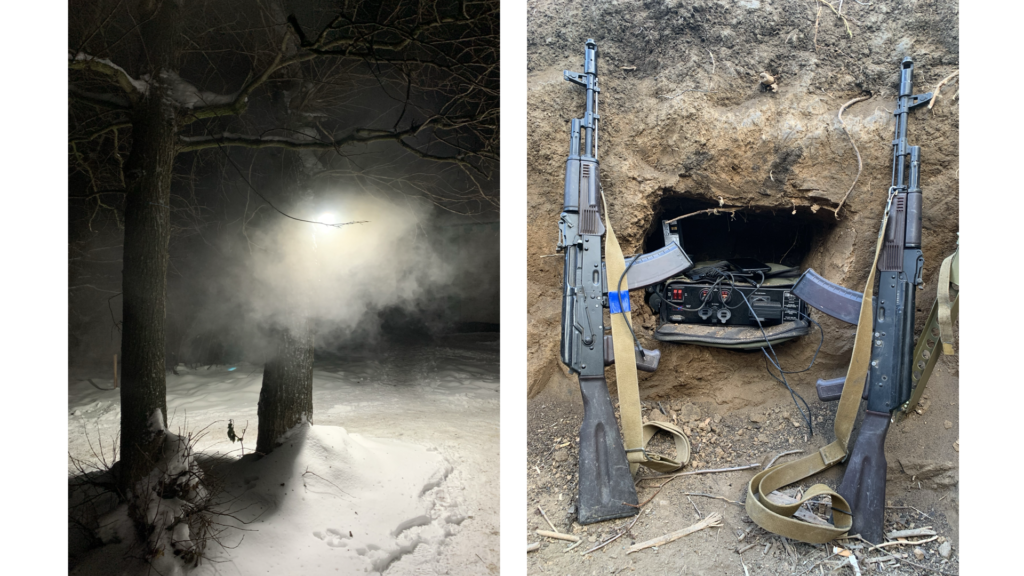
THE BEGINNING OF RUSSIA’S FULL-SCALE WAR AGAINST UKRAINE
MK: How do you remember February 24, 2022? What thoughts, memories, or situations do you remember the most vividly? What was happening around you?
TD: It Is hard for me to say, because the night before the invasion, Oleksii Podat and I had a party at his house. The next day I gathered friends, packed a suitcase and made sure that everyone was alive. Then, I slept until night, and a day later I already went to the military commissary, where I was told to come again the next day. In the meantime, I organised a small release of my old music on the Internet. I left the next morning and only recently came back to Kyiv. For me, February 2022 consisted of immediate training, military service, and so on.
MK: Tell us about your unit. Where were you located and what was a part of your service for these two years?
TD: I will not say much about it, because I do not want to build an image of a hero. From the very beginning until November 2023, I served in the 71st Jaeger Brigade of the Air Assault Forces within the Armed Forces of Ukraine. For about 14 months, I officially served as a radio-telephone operator of the artillery control platoon. I can explain it like this: when the headquarters needs to direct the artillery somewhere, then it needs a platoon that will stand next to the artillery, help it aim, orient, find targets, report on how it went— whether it was a hit or a miss, etc. I am more the eyes and ears of the artillery than the one actually loading the shells. I did not spend much time at the zero line, but I was near Novobakhmutivka6 on the outskirts when there were battles there. I was sticking out of the trench and pointing the artillery. I was not there for long, but it was super scary. I thought I was going to die there, because they were shooting at us heavily and very precisely. I had my 28th birthday there.
Then I was in a village on the very bank of the Dnipro river on the other side of Enerhodar.7 We were sitting and looking at the river, because we expected that Russians would start swimming and landing from Enerhodar or sneak in as saboteurs. We were on duty there 24/7 and were also shot at, including from the territory of the Zaporizhzhia Nuclear Power Station. I saw a self-propelled artillery unit driving out, shooting at us, firing a nearby house and driving back. Then I opened the news, where foreigners claimed that Ukrainians themselves were shelling and mining the station, when I was just shot at from there moments before. I could have taken a picture and shown them; the artillery unit could be seen with the naked eye, about three kilometres away. However, we could not shoot back. I had equipment and a compass to aim at them, but to do this would be insane. I stayed at this position for quite a long time, because there was no opportunity to advance since the Dnipro was ahead, and the Russians also could not capture our positions.
Of course, I spent a lot of time in the Donetsk region outside of the immediate combat area where strikes were constantly carried out. I lived in a dilapidated house, which was in a very poor condition. It was very cold, dirty, and it stinked. You could never take a shower. I also spent a lot of time living in forests.
After that, I was promoted to artillery staff sergeant of the brigade. The artillery staff sergeant is the only sergeant position in the artillery command of the brigade. There were various lieutenants, captains, colonels, and then me, just a guy sitting there. Of course, I was doing all the necessary paperwork: documents, spreadsheets, collecting data on expenses. A person in this position will no longer be sent to the trenches, so you can breathe a sigh of relief, but there are no days off—every morning, every afternoon, every evening you have to do work on the documents along with other tasks in between. I am so relieved not to be there anymore! I love everyone there, I respect and miss them, but it was very exhausting. We did not have enough people. I did work for several people at once. However, it was a great honour for me, because it is actually one of the highest positions for sergeants-soldiers in the entire brigade.
Now I work at a computer in Kyiv. It is more like office work, but it is useful, I like it.
MK: I came across your post about how you were reading the book by Vasyl Stus8 in the subway on the way to Nyzhnioiurkivska,9 where you realised a gap in perception of the war by people in Kyiv and those closer to the direct hostilities. Could you tell more about this? It is also interesting to consider in the context of Ukrainians abroad, among whom, according to my observation, there is a sharper transition to Ukrainian, restrictions on access to Russian products, etc.
TD: There are several nuances here, because it is more important to hold on to your identity abroad, as well as to speak Ukrainian, because you can easily forget it there if you fully switch to English, German, or any other language of the country in which you are. Here, in Ukraine, the Ukrainian language lives its life as you walk down the street, and it is impossible to avoid it. However, the same is true of Russian.
I do not think that Russian should be banned. It would be nice to forget it, but it is still everyone’s choice, and I cannot dictate any choices to anyone. I understand that just as it was not the time for me to switch to Ukrainian 10 years ago, for some it is not the time now. But if we are talking about my post where I read Stus in the subway and cried over his biography—the facts of life, where all is a constant torture—the problem was not in the Russian language itself, but because it was spoken a lot and loudly by young people, which saddens me, because I am afraid the younger generation is not changing for the better. If Russian is going to exist in public space, I would like it to be very quiet.
MK: It is popular to discuss the fact that Russian helps in communication with other people, territories, where Russian colonialism also operates, in particular the countries of the former Soviet space and beyond. However, for the foreign audience, I would like to maintain the thesis that Ukrainians’ sensitivity to Russian is also a completely natural process due to the fact that our language has been attempted to be erased for centuries. What would Western people do if, instead of their language becoming a lingua franca, it was also being killed? But the more important thing here is that the story about the persecutions of Ukrainian speakers on Russian speakers is part of the Russian PSYOP, do you think so?
TD: Yes, it is part of the Russian PSYOP, but when, for example, I got leave for the first time during my military service, I came to Kyiv, and some girl asked me for a cigarette in Russian, to which I replied: ‘Yes, but could you ask in a state language?’ She apologised, and it became super uncomfortable. So I immediately stopped doing this. Continuing to speak Russian now is a choice. If a person made this decision, why did they make it? This is in itself an interesting question, the answers to which can indicate many different views.
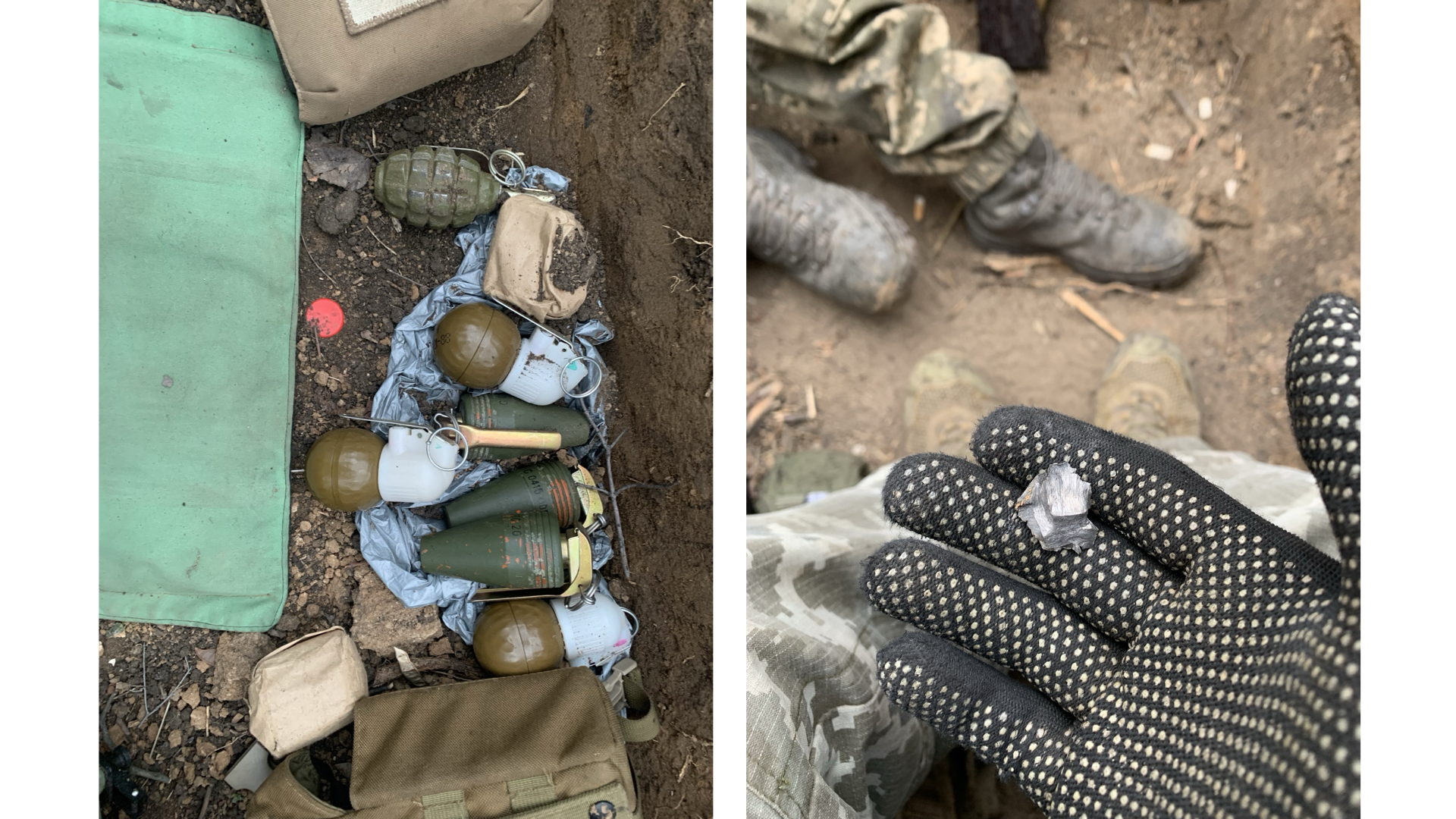
INTERNATIONAL DISCUSSION
MK: Do you follow the foreign discussion on the war in Ukraine: in social networks or in the online media? Do you find the way they discuss it relevant?
TD: No, because it only makes me sad. I choose to carry out my military service with dignity and quality every day, and thus destroy the enemy little by little. I do not concern myself much with other opinions, because I do not see a future in them. The way Germany, France, the US, the UK and a bunch of other countries reacted to the genocide tells me everything I need to know about them. I no longer want to play music abroad, and if someone asks why I do not play in Germany, for example, I will say: ‘Do you remember Leopard tanks10 were sent to Ukraine after a year and a half of genocide?’ Though, maybe it will not be like that, and I actually will agree to play in Germany. I have no clear plans to boycott, but I have a deep feeling that I have much less respect for or interest in any country other than Ukraine. I want to make music that Ukrainians will like and that will be needed here.
MK: I wanted to refer to your text In Moskau geboren, lebt in Leipzig. For me, one of the most important theses of the text was that Ukraine’s victory is the only hope for Russians to live in a civil society. After all, they will not overcome the internal dictatorship, and their opposition is dysfunctional…
ТD: Now the opposition is all dead.
MK: Yes, whereas the foreign community is sufficiently upset about Navalny’s death. Although he supported the annexation of Crimea and other imperial ambitions.
TD: If Navalny were in power, I am not sure he would have stopped the war. It would be much more difficult to fight with him, because he is more cunning. If he became the president, he would probably say this is necessary to end the war and look for a diplomatic solution. Something like: ‘Let’s hold negotiations, but, of course, we will not give up the territory.’
MK: Returning to the question: what at all could be considered a victory for such a pseudo-state as Russia, which is completely dysfunctional?
TD: I do not know what victory is for them because I do not know what their goals are. Their goal was probably to remove Ukraine from the world’s map and occupy the entire territory of the country. I think that it quickly changed to the goal of killing as many Ukrainians as possible. I do not know what they are prepared to present to their citizens as a victory. I think that there may be a scenario where they retreat not to the borders of 1991, but at least the occupied Crimea. I think this would be unacceptable, but they may possibly be able to describe it as a victory for their citizens. As they frame it, ‘denazification’ implemented, hundreds of thousands of ‘Nazis’ killed.
MK: And what does victory mean for us, Ukrainians? First of all, we talk about the preservation of our territorial integrity. There is an active discussion ongoing in the international community, especially promoted by Ukrainians, surrounding the mandatory decolonisation of the Russian Federation from within, however we are also observing both the development of BRICS, new currencies and coalitions, as well as the huge scale of people who are under the influence of Russian propaganda abroad. Considering the current situation, of course, the disintegration of the Russian Federation is necessary, because otherwise Russia will attack Ukraine and other countries again in the near future, but it is difficult to believe in the reality of such a large-scale mission.
TD: This disintegration is, of course, critically necessary and generally unavoidable, because such a large prison of nations cannot exist, but it does not particularly concern me. I am not going to divide other people’s lands, cut them up, make these decisions. I just want a huge wall so that I never see Russians again, including local ethnicities who killed us the same way. I am as angry with people from Dagestan as I am with people from Moscow. Decolonisation, if they do not begin to think about it themselves, will happen differently: Russia could collapse and there would be a bunch of criminal authorities managing different parts of it. This will be another corrupt government, where there is not one tsar of Moscow, but thirty little tsars. I used to have ideas about poor oppressed nationalities. I wanted to say: ‘Stand up, you can free your land from the occupation just like us’, but for two years no one has done anything.
I liked that Russians already witnessed their passivity themselves, because yesterday I specifically checked comments about Navalny’s death on Meduza.11 There, everyone lamented: ‘what a black day’, ‘how to go on living’,’ ‘no words’. They always have ‘no words’. And then: ‘Are we going to go out somewhere? Protest? No, we were once slaves, so we will continue to be so.’ Around five or ten percent of the comments were like this, so a quite large proportion. This is sad, because I was hoping that someday Russians would hang their Hitler, but they are already reminding themselves that they are slaves. I do not know what the next stage is after this much-internalised colonisation.
MK: This is very interesting, because just yesterday I saw reports of Russians taking to the streets, and I was wondering how true this really was, instead of being a part of the paid media agenda created to be further developed in the West.
TD: Of course some people will come out onto the streets, because it is very important to come out and not win. It is important to pretend that the opposition exists: ‘We are trying, we are just not succeeding.’ The West really likes it, because it shows that Russians are poor, and they are suffering. This brings us to the paradox at the heart of this war, because it is impossible to say how many people would have to come out to oust Putin. It is also impossible to say how many tanks Ukraine needs to defeat Russia. Maybe General Zaluzhnyi or General Syrskyi know the number, modifications, and location to place them. I know that General Zaluzhnyi gave certain numbers to our Western partners, but these needs were not met.
The problem is that many people in the West speak to the Ukrainians from such a position as if they know how many tanks are needed or how many people should go out. Such determinism is a part of this conversation where you are told about a hypothetical future, in which Putin would supposedly be overthrown, if he could be overthrown. Ukrainians could say: ‘No, we ousted our president; we did not succeed on the first day, we did not succeed on the second day, but there was a day when we succeeded.’ Maybe we could have done it even faster, and fewer people would have died. Nevertheless, for some reason, the discussion is always conducted from the position that it can be seen in advance. Smart Western people see that not enough people just came out.
MK: In this context, I remembered the interview that Putin recently gave to the American pro-Trump journalist Tucker Carlson. For us Ukrainians, it looks like the complete debunking of Putin’s narratives,12 but for the West, the entire rhetoric of this discussion is constructed in such a way that Putin is allegedly ridiculing right-wing movements in the US, thus speaking on the side of leftist values.
TD: What annoys me more is that someone from the USA came to interview Putin, thus legitimising his power. I am surprised it even happened. In general, it is completely irrelevant what Putin says there, because political decisions are not made on the basis of these interviews. Unfortunately, in the modern world a person’s words do little to discredit them in the political space.
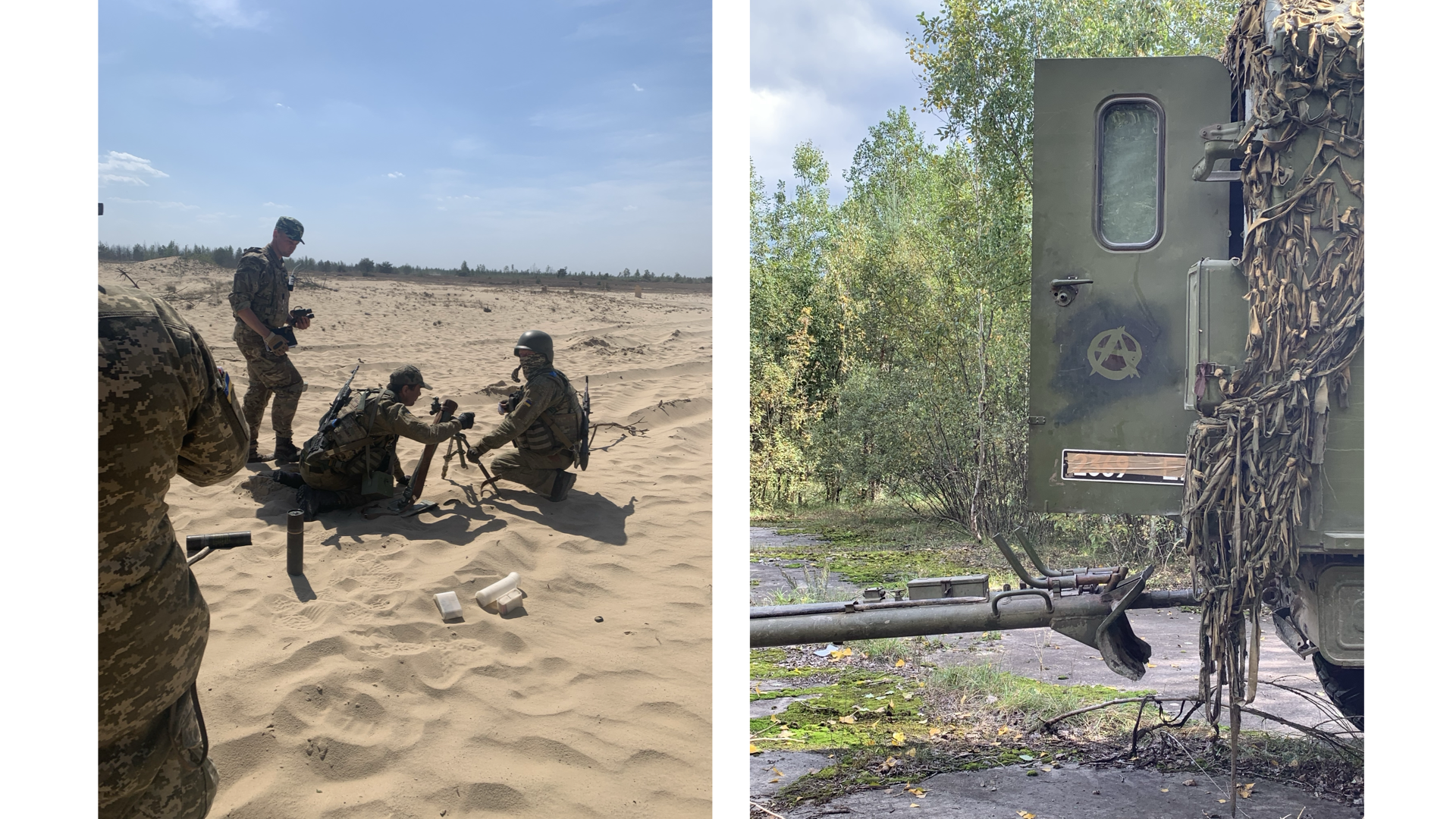
VICTIMS OF THE WAR/S
MK: In another of your texts, which was written for the Construction Festival in Dnipro,13 you say: ‘We are not victims. We are a military tribunal for fascists.’ What exactly did you mean and why was it important for you to articulate in your text?
TD: First of all, I look at the war from a military point of view, and it will not be productive for me to have thoughts about defeat or death. It is much more productive for me to know that I can complete the tasks set before me, survive and see the end of the war. Because the real victims, who are already dead, cannot say anything themselves. The documentation speaks for itself. I want to limit the spread of negative sentiments because they are not productive.
We have no alternative; we can only win, or we will all be killed, because living under occupation is not an option. I have to communicate in such a way that it forces someone to put pressure on the local authorities and to take some action. Donations are not enough. I am surprised that foreigners are not coming to Ukraine and joining the ranks of the Armed Forces. Some do it, but very few.
MK: The international community is also concerned with other wars, particularly in Palestine.
TD: I am worried too. Before the full-scale invasion, I had a song in a compilation that raised money to support Palestine. However, now the priority for me is the war that is happening in my country. Maybe that makes me selfish and not progressive, but as long as I am being shot at, that is all I will think and talk about. Once we have victory, I can happily support the decolonial discourse in many places, but not now.
It seems to me that Western people operate on this paradox of ‘when is enough’ in the same way in the context of helping Ukrainians. Like, when the Ukrainians will say ‘thank you’ and finish the war. But that will only happen when you give us enough weapons to win. People on the internet think we are ungrateful just because they have not given us enough, which is paradoxical.
I believe that the world, especially in the face of superpowers and former empires, has obligations to humanity. If the collective Western civilization is incapable of stopping genocide, then why is it needed? I cannot be thankful for not being killed today. When I wake up in the morning and I am alive, it is normal. It is not happiness, it is normal. Whereas when someone helps stop the genocide, that is the least they can do. This is not a widespread opinion, unfortunately, because people abroad, without seeing blood and death, without feeling rockets targeted at them, think only about their tax money.
This is one of the ideas for texts that I have been wanting to write for a long time. I do not know how to convey this feeling to people: how to tell them about the Budapest Memorandum, where Ukraine literally disposed of or gave away a lot of weapons because we were told that we did not need them, and that we would be protected. In response to this, any communist abroad can tell me that such a memorandum is not a promise, but a statement of intentions. It is very carefully formulated so as not to oblige anyone to any actions. It will always be only our problem, and no one will ever think that there is some kind of innately human morality and ethics. There is something that makes us human. It is not convenient to think about it; ‘We will talk about it later.’ Like after the Second World War, when the war was analysed in books.
MK: And then everything happened again.
TD: Everything happened again and, unfortunately, we are now in the part of a film where everyone is being killed.
No one ever wants to do a hard thing. I did not want to either, but it seemed to me that I had no choice. Whereas ordinary Russians and citizens of Western countries have a choice every day, but no one does real actions. This does not surprise me, but since I do not want to die, I have to keep working. Maybe one day people will understand that we do not want to die. Though, maybe, they will understand it right before they die.
MK: Or maybe not.
TD: Maybe not.
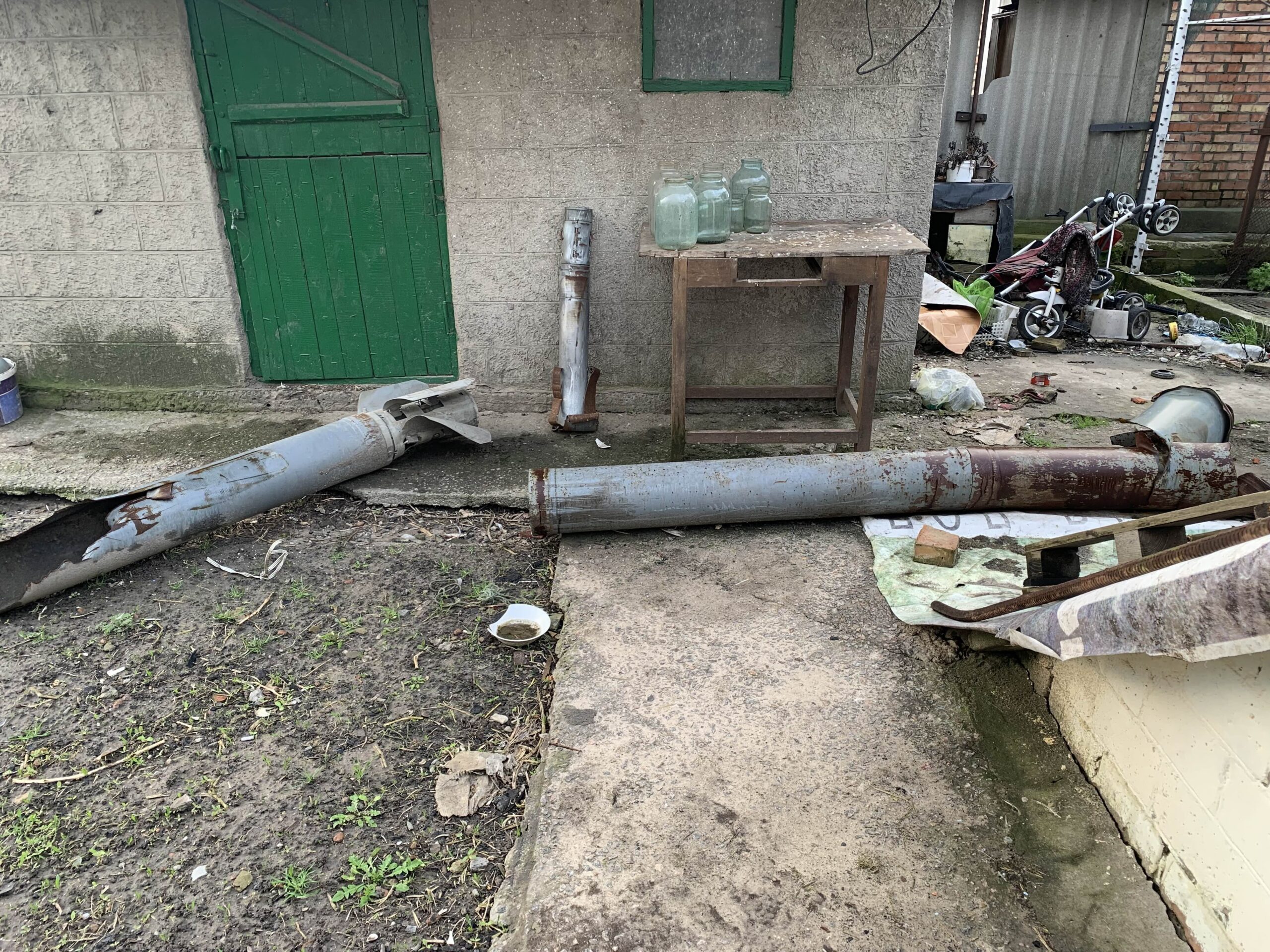
All the images are by Timur Dzhafarov. The text is edited by Ada Wordsworth.
Timur Dzhafarov (born 1995) is a Ukrainian soldier and musician. He has served in the Armed Forces of Ukraine since Russia’s genocidal full-scale invasion of Ukraine, and produced experimental electronic music as John Object before, playing at Ukraine’s own Cxema, Boiler Room, Brave! Factory Festival, and many European venues.
Published 8 March 2024
The conversation is prepared within the Erasing and Recalling project supported as part of the (re)connection UA 2023/24 programme, which is implemented by the Museum of Contemporary Art (MOCA) NGO and the Ukrainian Emergency Art Fund (UEAF) in partnership with UNESCO and funded through the UNESCO Heritage Emergency Fund.
- Tabasaran people or Tabasarans are one of the Northeast Caucasian ethnic groups living in the Republic of Dagestan, which is a part of the Russian Federation today.
2. At this time, all male citizens of the Soviet Republics had to complete 2 years of military service for the Ground and Air Forces or 3 years in the Soviet Navy.
3. The city has been called Dnipro since 2016 due to the decommunisation law as it was formerly named after the Soviet politician Hryhorii Petrovskyi. People in Ukraine call Dnipro Dnipropetrovsk when they remember the city in Soviet times.
4. A Russian online social media popular in ex-Soviet space, which was banned in Ukraine since 2017 due to the Ukrainian sanctions against Russia.
5. A badge that is used in a military uniform that represents a military unit or a brigade.
6. A village near Bakhmut, a city in the Donetsk region that is currently occupied by the Russian army.
7. A city in Zaporizhzhia region currently under occupation, where the Zaporizhzhia Nuclear Power Station is located.
8. A Ukrainian dissident poet, human right activist, and a member of the Ukrainian Helsinki Group among other titles. Throughout his life, he was persecuted by the Soviet regime and spent 13 years of life as a political prisoner until died during torture.
9. A street in Kyiv where all the rave parties and techno clubs are located, including Closer, Otel’, etc.
10. Leopard 1 and Leopard 2 are the main battle tanks (MTB) produced in Germany.
11. A popular Russian media website with headquarters in Riga, Latvia.
12. For example, Putin claimed that in 1939 Poland forced Hitler to start WW2 by invading the country. Or that Ukraine as a state was created by the Russian leader of the Bolshevik Revolution of 1917 Vladimir Lenin.
13. The audio-visual festival in Dnipro Center for Contemporary Culture that is held each year. In 2023, it was the eighth iteration of the festival titled Ukrainian Hardcore: Learning from the Grassroots.
